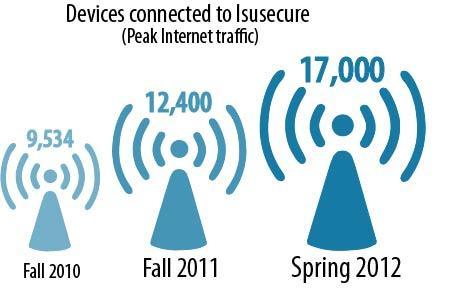Students and faculty members may have experienced problems accessing the lsusecure wireless network due to a significant spike in Internet traffic, according to Sheri Thompson, IT communications and planning officer.
University Information Technology Services has seen wireless traffic reach as many as 17,000 simultaneous users this semester. That number represents about 62 percent of the approximately 27,162 students enrolled this spring.
Usage typically hovers at 7,000 simultaneous users, Thompson said. But peak Internet usage from this semester dwarfs past numbers.
The Daily Reveille reported in September 2011 that Internet usage had reached its highest volume, with 12,400 devices using the network at once. Although that number is significantly less than this semester’s peak usage, it eclipses peak usage from the past.
ITS tracked as many as 9,534 devices using the network during the fall 2010 semester. These numbers represent a larger trend of increasing wireless Internet usage on campus.
According to a recent Public Policy Research Lab study, 92 percent of LSU students surveyed said they own a laptop computer, usually equipped with Wi-Fi capability.
Students have been vocal about their troubles accessing the Internet in the past, but many are using alternative methods to express their discontent.
One recent post on the Facebook page “LSU Memes” contained a half-loaded picture captioned “not sure if LSU secure is being slow again.” The post generated more than 200 likes.
One of the University’s Southeastern Conference counterparts has experienced similar problems.
University of Alabama dance sophomore Sarah Lauridsen said students in Tuscaloosa, Ala., experience problems similar to that of the wireless Bengals of Baton Rouge.
“We have two wireless networks, a public network as well as a residential one in on-campus housing,” Lauridsen said. “It is usually good for me, but I do know some students that have had problems.”
LSU’s Internet is provided through the Louisiana Optical Network Initiative, housed at LSU. It provides basic connectivity for all major research institutions in Louisiana and Mississippi, according to LONI’s website.
LSU has a 10-gigabyte connection to LONI, according to Thompson, but only 1.5 gigabytes are used for commodity Internet.
“Commodity Internet is what most students will use on campus,” Thompson said. “The rest of LONI’s capacity is reserved for research, such as the QueenBee supercomputer downtown.”
QueenBee is the core supercomputer of LONI and was the 23rd fastest supercomputer in the world as of June 2007, according to the LONI website.
Thompson said the University and LONI are working together to identify and fund additional commodity Internet to meet growing needs.
____
Contact Joshua Bergeron at jbergeron@lsureveille.com
University wireless Internet usage spikes substantially
February 23, 2012





